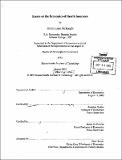Essays on the economics of health insurance
Author(s)
McKnight, Robin
DownloadFull printable version (7.180Mb)
Other Contributors
Massachusetts Institute of Technology. Dept. of Economics.
Advisor
Jonathan Gruber and James M. Poterba.
Terms of use
Metadata
Show full item recordAbstract
This thesis brings together three essays on issues in the economics of health insurance. The first study considers the effects of average per-patient caps on Medicare reimbursement for home health care, which took effect in October 1997. I use regional variation in the restrictiveness of per-patient caps to identify the short-run effects of this reimbursement change on home health agency behavior, beneficiary health care utilization, and health status. The empirical evidence suggests that agencies responded to the caps by shifting the composition of their caseload towards healthier beneficiaries. In addition, I find that decreases in home care utilization were associated with an increase in outpatient care, and had little adverse impact on the health status of beneficiaries. In the second paper, I examine the impact of Medicare balance billing restrictions on physician behavior and on beneficiary spending. My findings include a significant decline in out-of-pocket expenditures for medical care by elderly households, but no impact on the quantity of care received or in the duration of office visits. The third paper (written with Jonathan Gruber) explores the causes of the dramatic rise in employee contributions to employer-provided health insurance over the past 20 years. We find that there was a large impact of falling tax rates, rising eligibility for insurance through the Medicaid system and through spouses, and deteriorating economic conditions (in the late 1980s and early 1990s). We also find more modest impacts of increased managed care penetration and rising health care costs. Overall, this set of factors can explain about one-quarter of the rise in employee contributions over the 1982-1996 period.
Description
Thesis (Ph. D.)--Massachusetts Institute of Technology, Dept. of Economics, 2002. Includes bibliographical references.
Date issued
2002Department
Massachusetts Institute of Technology. Department of EconomicsPublisher
Massachusetts Institute of Technology
Keywords
Economics.